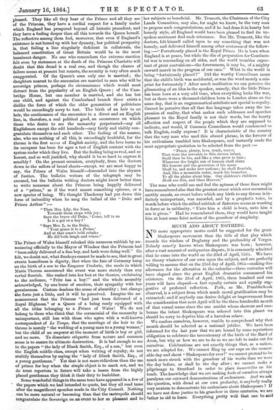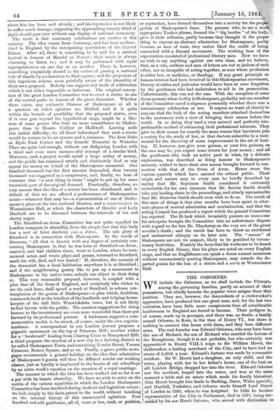MUCH ADO ABOUT NOTHING-.
No more appropriate motto could be suggested for the great Shakespeare movement than the title of that play which records the wisdom of Dogberry and the profundity of Verges. Nobody exactly knows when Shakespeare was born ; however, after a vast amount of antiquarian dispute, it is commonly admitted that he came into the world on the 23rd of April, 1564. We have no theory whatever of our own upon the subject, and are perfectly willing to assume that on the 23rd day of April, 1864—making due allowance for the alteration in the calendar—three centuries will have elapsed since the great English dramatist commenced his existence. On the 23rd of April, 1865, three hundred and one years will have elapsed—a fact equally certain and equally sug- gestive of profound reflection. Pork, as Mr. Pumblechook observed, is a subject from which much moral gratification maybe extracted ; and if anybody can derive delight or improvement from the consideration that next April will be the three hundredth month of that vernal name since the one amidst whose showers and sun- beams the infant Shakespeare was ushered into this planet we should be sorry to deprive him of a harmless solace.
We confess ourselves, however, unable to comprehend why that month should be selected as a national jubilee. We have been informed for the last year that we are bound by some mysterious obligation to celebrate the tercentenary of the birth of the Bard of Avon, but why or how we are to do so we are left to make out for ourselves. Celebrations are not exactly things that, as a nation, we are adapted for. We cannot fling up our caps on the memor- able day and shout " Shakespearefor ever!" we cannot pretend to be much more struck with the grandeur of his works than we were the day before, or shall be the day after ; we cannot make a pilgrimage to Stratford in order to place immortelles on his tomb. The knowledge that we are making fools of ourselves always paralyses our outward demonstrations of enthusiasm. And we ask the question, with dread at our own profanity, is anybody really very anxious to demonstrate his enthusiasm about Shakespeare ? If we have not done justice to his grandeur in three centuries, we are rather to old to learn. Everything pretty well that can be said
about him has been said already ; and his reputation is not likely to suffer much damage, supposing the approaching twenty-third of April should pass over without any display of national mummery.
The truth is that centenary celebrations are exotics in this country. The idea comes from Germany, and has been acclima- tized in England by the enterprising speculators of the Crystal Palace. After all, there is something to be said for a musical festival in honour of Handel or Mozart; their music is always charming to listen to ; and it may be performed with equal appropriateness on one day as on another. There is, however, something exquisitely absurd in the notion of passing a national vote of thanks by acclamation to Shakespeare, and the projectors of this ingenious scheme seem painfully aware of the absurdity of their own proposal. Nobody can suggest any mode of celebration which is not either impossible or ludicrous. The original concep- tion of the great London Committee was to erect a statue in one of the central parks in honour of the great dramatist. Whether there exists any authentic likeness of Shakespeare at all is a question on which opinions are divided, and it is quite within the bounds of possibility that the proposed statue, even if it ever gets beyond the hypothetical stage, might be a like- ness of some person who bore no more resemblance to Shakes- peare than to Messrs. Collyer or Halliwell. Leaving aside this initial difficulty, we all know beforehand that such a statue would be certain to be an eyesore and a nuisance. The Iron Duke at Hyde Park Corner and the Guards' Memorial in Waterloo Place are quite bad enough, without our disfiguring London with a third and even more unsuccesful attempt of a similar kind. Moreover, such a project would entail a large outlay of money, and the public has remained utterly and obstinately deaf to any appeal for money on behalf of the Shakespeare memorial. One hundred thousand was the first amount demanded, then twenty thousand was suggested as a compromise, and, finally, we hear of rumours that " a neat thing in stone " might be put up for some twentieth part of the original demand. Practically, therefore, we may assume that the idea of a statue has been abandoned, and in default of that we are offered a performance of Shakespearian music—whatever that may be—a representation of one of Shake- speare's plays at the two national theatres, and a eonversazione in Westminster Hall, at which the characters of Hamlet and Lady Macbeth are to be discussed between the intervals of tea and sherry negus.
The Stratford-on-Avon Committee has not quite equalled its London compeers in absurdity, from the simple fact that this body has a sort of faint shadowy ruisjn d'être. The sole glory of Stratford is in connection with Shakespeare. In the words of Steevens, " All that is known with any degree of certainty con- cerning Shakespeare is, that he was born at Stratford-on-Avon, married, and had children there, went to London, where he com- menced actor, and wrote plays and poems, returned to Stratford, made his will, died, and was buried." If, therefore, the memory of the dramatist has a local habitation anywhere it is at Stratford ; and if the neighbouring gentry like to put up a monument to Shakespeare in his native town nobody can object to their doing so. This very reasonable proposal, however, is coupled with a plan that all the lions of England, and everybody who wishes to see the said lions, shall spend a week at Stratford, in solemn con- templation of the genius of Shakespeare—a plan which, doubtless, commends itself to the intellect of the landlords and lodging-house- keepers of the dull little Warwickshire town, but is not likely to find favour with the public. The amateur suggestions for doing honour to the tercentenary are even more wonderful than those put forward by its professional patrons. A tradesman suggests a com- memorative medal, to be struck, of course, under his own superin- tendence. A correspondent to one London journal proposes a gigantic monument on the top of Primrose Hill ; another wishes for a "boulevard" leading from Charing Cross to Hampstead Hill; a third proposes the erection of a new city in a thriving district to be called Shakespeare Town, and containing Hamlet Street, Verona Crescent, Romeo Square, and so on. Finally, a grave public news- paper recommends a general holiday, on the idea that admiration of Shakespeare's genius will thus be diffused amidst our working classes, just as loyalty is implanted in the hearts of our schoolboys by an extra week's vacation on the occasion of a royal marriage.
The manner in which the idea has been worked out so far is on a par with its innate absurdity. We have no wish to enter on the merits of the carious squabbles in which the London Shakespeare Committee has been involved during its short and inglorious career ; we look simply to the facts patent to the world, without touching on the internal history of this unsuccessful agitation. Four hundred and odd gentlemen, all of, more or less, rank, or position, or reputation, have formed themselves into a society for the propa- gation of Shakespeare's fame. The persons who, to use a most appropriate Yankee phrase, formed the " big beetles " of the body, gave it their adhesion, partly because they thought it the proper thing to express an abstract admiration for Shakespeare, partly because, as men of rank, they rather liked the credit of being connected with a literary movement. The working bees of the organization consisted of professional literary men. Now we have no wish to say anything against our own class, and we believe, that, as a rule, authors and men of letters are not so jealous of each other, nor so incapable of acting together, as men whose profession is either law, or medicine, or theology. If any great principle or human interest had been involved in this Shakespearian movement, literary rivalries and jealousies would have been at once forgotten by the gentlemen who had undertaken to aid in its prosecution. Unfortunately, this was not the case. With the exception of some dozen persons whose hobby is Shakespeare, probably not one member of the Committee cared a sixpence personally whether there was a tercentenary celebration or not. It argues no want of charity to suppose that the bulk of the acting members attached themselves to the movement with a view of bringing their names before the world. In so doing they used a very natural and perfectly irre- prehensible method of advancing their professional interests. They gave in their names for exactly the same reason that barristers join a society for the study of law, or that doctors subscribe to a testi- monial for the discovery of some improvement in the art of heal- ing. If, however, you give your guinea, or your five guineas, as the case may be, you expect some return for your money ; and all the gentlemen who took an active part in what, by a delicate euphemism, was described as doing honour to Shakespeare's memory, wished to have their own names brought forward in con- nection with that of the Swan of Avon. Hence arose the various quarrels which have amused the critical public. Their origin and nature may in every case be briefly described by saying that Mr. Septimus Smith considered it extremely undesirable for his own interests that Mr. Sextus Smith should take any leading share in the proceedings, and utterly unreasonable that Mr. Octavius Smith should even wish to do so. The result of this state of things is that nine months have been spent in alter- nate phases of mutual admiration and recrimination, and that the acting Council has produced a report which the general Committee has rejected. The ill-luck which invariably pursues an unsuccess- ful enterprise brought the Committee into an unfortunate dispute with regard to the late Mr. Thackeray on the very eve of the great- novelist's death ; and the result has been to throw an accidental and undeserved obloquy on its later acts. The " manes" of Shakespeare are not, we suspect, likely to be gratified by tercen- tenary festivities. Possibly the facts that his works are to be found in every English library, that his plays are acted on every English stage, and that no Englishman can speak a dozen earnest sentences without unconsciously quoting Shakespeare, may console the de- parted genius for the loss of a statue and a soirée at Westminster Hall.































 Previous page
Previous page